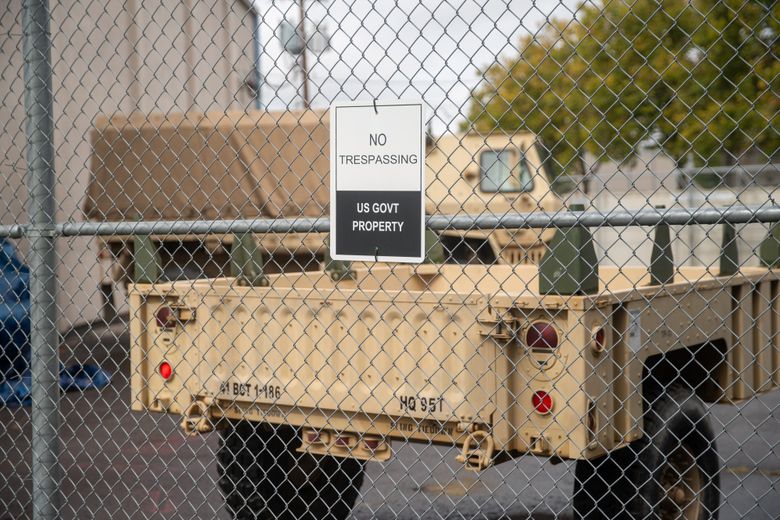Judge extends two restraining orders on deployment of National Guard to Oregon
Oct. 15, 2025 at 12:55 pm

The Oregon National Guard Armory in Salem on Oct. 2. A judge Wednesday extended two temporary restraining orders that barred President Donald Trump from deploying any National Guard members to Portland for another two weeks. (Mark Graves/oregonlive.com/TNS)
By
Maxine Bernstein
oregonlive.com
A judge Wednesday extended her two temporary restraining orders that barred President Donald Trump from deploying Oregon National Guard members — or any National Guard members — to Portland for another two weeks.
Oregon U.S. District Judge Karin J. Immergut granted the extensions as all sides await a ruling from the 9th U.S. Circuit Court of Appeals on whether her initial temporary restraining order will stand that barred the mobilization of 200 Oregon National Guard members to protect Portland’s U.S. Immigration and Customs Enforcement building in South Portland.
The judge said she also plans to proceed with an expedited three-day trial that will delve into the merits of the state and city’s underlying lawsuit challenging the federal deployment of National Guard troops in Portland. She tentatively set an Oct. 29 date for the trial.
She said the trial would be limited to the two legal standards that her temporary restraining orders rested on: the federal code’s Title 10, Section 12406, which sets out criteria the president needs to meet in order to place National Guard troops under federal control, and the Tenth Amendment, which protects the state’s sovereign interests and says that powers not delegated to federal officials are reserved “to the States.”
Related
On Oct. 4, Immergut issued a 31-page ruling granting the state and city of Portland a temporary restraining order, blocking the federal government from sending Oregon National Guard troops to Portland for 14 days.
The order followed a memo sent to the state Sept. 28 by Defense Secretary Pete Hegseth saying he was mobilizing 200 Oregon National Guard troops into federal service for 60 days to protect the U.S. Immigration and Enforcement field office in Portland amid nightly protests.
Immergut found the Trump administration lacked any legal justification to mobilize troops, noting no threat of rebellion exists in Portland, that local police can handle the sporadic protests at the ICE building and federal officers are still able to enforce federal laws. No National Guard troops have appeared at the building.
The next night, after Trump sent up to 200 California National Guard members to Portland and called up Texas National Guard members to respond to Oregon as well, Immergut issued a second broader temporary restraining order that barred the federal deployment of any National Guard members from any state in Oregon.
On Oct. 8, a three-judge panel of the 9th Circuit granted a brief administrative hold on Immergut’s initial restraining order, ruling that Oregon National Guard members may remain under federal control but cannot deploy to Portland while the panel deliberates on the case.
The federal government did not challenge Immergut’s second and broader temporary restraining order to the appellate court.
If the 9th Circuit blocks Immergut’s initial restraining order, Immergut said she would likely dissolve it and the extension.
Michael Gerardi, senior trial counsel for the U.S. Department of Justice’s civil division, argued that if the 9th Circuit blocks the initial restraining order, the federal government also would ask Immergut to dissolve the second broader temporary restraining order since it was based on the same conclusions that supported her initial restraining order.
Immergut said the federal government should make that request within 48 hours of any 9th Circuit decision.
The three-judge panel of the 9th Circuit held a hearing last Friday and is expected to rule at any time on whether to grant a more lasting hold on Immergut’s initial restraining order as it considers the federal government’s appeal on the merits of the order.
Separately Wednesday, Immergut sought to address disputes over the scope of discovery of evidence for the future expedited trial on the merits of the lawsuit.
Immergut said both sides may call witnesses for the three-day trial to create as “robust a record as I can” that can benefit the 9th circuit in the future as well.
With the expedited time frame for the three-day trial, she urged both sides to significantly “pare down” their discovery requests.
Lawyers for the state are seeking from the federal government a list of federal arrests, all accounts of any interference with federal enforcement of the law and records on the staffing of federal law enforcement at the ICE facility, Marshall said.
Gerardi, for the federal government, also signaled that he might ask for a full hold on any proceedings before Immergut pending the outcome of the federal government’s full appeal of her temporary restraining order.
“We clearly don’t think this procedure is appropriate,” he said.
A temporary restraining order is designed “just to be a pause,” until the district judge can consider the underlying claims in the state and city’s lawsuit, said Tung Yin, a Lewis and Clark Law School professor.
Most Read Nation & World Stories “We’re at the very beginning of this. Litigation moves at a very glacial place,” Yin said.
A full appeal of Immergut’s temporary restraining order to the 9th Circuit could take several months, as could an appeal of however Immergut rules at the end of the expedited trial. A writ to the U.S. Supreme Court seeking review could follow.
“We could be waiting two years until we get an answer to this,” Yin said.
Among the questions as litigation goes forward, he said, are: “Does the president get to do whatever he wants in that time — or does everything stay on hold here?”
Maxine Bernstein.
©2025 Advance Local Media LLC. Visit oregonlive.com. Distributed by Tribune Content Agency, LLC.
seattletimes.com |





